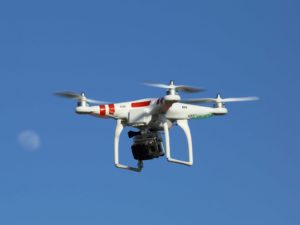Thinking about using a drone for your business and expect your company’s general liability policy to cover any accidents and damage it may cause? Better read the policy.
Most general liability policies contain a broad exclusion that applies to aircraft (as well as autos and watercraft). The exclusion eliminates coverage for any bodily injury or property damage that you (or any other insured) cause while owning, maintaining or using an aircraft.
 The exclusion also applies to aircraft that you rent, borrow or entrust to someone else. Here is an example of how the exclusion might apply.
The exclusion also applies to aircraft that you rent, borrow or entrust to someone else. Here is an example of how the exclusion might apply.
While that exclusionary language would seem to not include drones, a recent court decision said it does apply to them. The standard language was written before drones really came on the scene, but the ruling said that drones fall into the catchall term for “aircraft.”
In the case in question, a wedding guest lost an eye when a drone being used by the wedding photographers made contact with it. A Tokio Marine Holdings Inc. unit refused to pay for the claim, saying that the aircraft exclusion meant it would not have to defend or indemnify the photography firm.
The injured woman filed suit in a Southern California superior court against the photography firm, its owner and an employee. The firm sought coverage from its insurer.
The insurer filed an action in the U.S. District Court asking for a summary judgment over whether Tokio Marine had the duty to defend and indemnify the photography firm under the policy.
The policyholder had argued that the policy’s aircraft exclusion did not apply in this case because the drone could not be classified as an aircraft as it was not carrying people or cargo and that it was “unmanned and operated remotely.”
But the U.S. District Court ruled that the drone is an aircraft nonetheless, stating: “The ordinary definition of an aircraft does not require the carrying of passengers or cargo. Additionally, that a drone is unmanned and operated remotely does not make it less of an aircraft.”
The court added that the insurer did not have a duty to defend the firm in the lawsuit or indemnify it for any damages the drone had caused.
The takeaway
Many companies use drones in their business operations, while the Federal Aviation Administration defines a drone as a type of aircraft.
Given that definition and the U.S. District Court ruling, drones are subject to the aircraft exclusion described above.
If you do use drones in your business, you can insure them for liability and hull damage under a special policy designed for unmanned aircraft.
The Andrew Agency
The Andrew Agency is an independent insurance broker serving clients in Virginia, Maryland and D.C. If you have questions about drone insurance, contact us at 804.320.2886 or [email protected].










